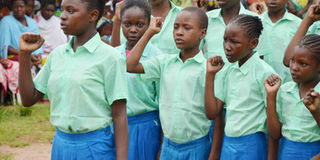Study urges teaching of reproductive health to teenagers in slums

Primary school girls entertain guests at a function. A study conducted in Korogocho and Viwandani slums in Nairobi advocates for the inclusion of reproductive health as an examinable subject in schools. FILE PHOTO | NATION MEDIA GROUP
What you need to know:
- Well informed teenagers would take charge of their lives as compared to the practical trial-and-error lifestyle witnessed during the survey.
- The researchers say that sex education, if enhanced in schools, would demystify the subject.
- The study compares slum life in Kenya with that in Bangladesh and Brazil and notes some glaring similarities in reproductive health challenges facing young girls.
- The researchers urged parents, especially in the slums, to be adequately involved in teaching teenagers on the risks of pre-marital sex.
Teenagers living in slums could lead better lives if reproductive health became an examinable subject in schools.
This has been revealed by three researchers who have been investigating teenage pregnancies and the spread of sexually transmitted infections in slums in Kenya.
In a study carried out in Nairobi’s Korogocho and Viwandani slums over a three year period, Dr Donatien Beguy, Ms Joyce Mumah, both from the African Population and Health Research Centre, and the US based Johns Hopkins School of Public Health’s Lindsey Gottschalk say well informed teenagers would take charge of their lives as compared to the practical trial-and-error lifestyle witnessed during the survey.
“Adolescents living in the slums engage in riskier sexual behaviour than their peers in non-slum parts of cities, including early sexual debut, transactional sex, and multiple sex partnerships. Adolescents aged between 15 and 22 know very little about contraception while poverty makes it impossible for them to access contraceptive methods and affects their ability to control their reproductive life,” it says.
DEMYSTIFY SEX EDUCATION
The researchers say that sex education, if enhanced in schools, would demystify the subject and that it will not only reduce risky sexual behaviour but also reduce unintended adolescent pregnancies, which will have significant impact on their wellbeing.
The study which compares slum life in Kenya with that in Bangladesh and Brazil notes some glaring similarities in reproductive health challenges facing young girls. These include unplanned pregnancies as a result of given poor education, insecurity within the community and low-levels of autonomy stemming from cultural norms and poverty.
“Although the Kenyan government has made significant strides in addressing the sexual and reproductive health (SRH) needs of young people including passing significant policies such as the National School Health Policy, the implementation of this policy and its reach to young people is still low,” laments the report entitled 'Unintended pregnancies among young women living in urban slums.’
The explosive report published in the scientific international journal, PLOSONE, urged the government to hasten SRH education’s implementation and other youth related policies that will help demystify comprehensive sexuality education via use of innovative delivery channels as a matter of necessity.
It observes that unwanted pregnancies have also led to emergence of quack 'clinics’ where illegal abortions take place thereby endangering the lives of young women.
“Targeted multipronged interventions which address the economic, education and gender consideration of young people will therefore have the most direct influence on their behaviour,” the study says.
It found that 41 per cent of pregnancies were unintended, with 26 per cent being ill-timed while 15 per cent were unwanted, all blamed on early sexual activity fuelled by living arrangements, marital status of parents and schooling status.
While about 37 per cent of teenage girls reported to have had sexual intercourse, the report observes that helping girls access secondary education saw fewer girls engaging in risky behaviour. They also engaged in meaningful activity to acquire skills that would help them earn a decent living.
PROTECTIVE MECHANISM
“Increased education might therefore act as a protective mechanism that not only prevents early sexual initiation, but more education improves the understanding by young women of the need to protect themselves from unintended pregnancy,” says the 3-year prospective survey.
The survey collected information from adolescents living in the two slums and involved 849 young women.
Interestingly, the researchers also looked at ethnicity of the interviewees and observed that higher access to education among girls from highly urbanized regions before they migrate to the urban slums saw them less prone to becoming pregnant compared to communities where childbirth is celebrated.
The crowded living conditions where parents share single rooms with their children was also found to have adverse effects on adolescents.
At the same parents who were overly controlling on their also increased the possibility of their children engaging in risky sexual behaviour.
The researchers urged parents, especially in the slums, to be adequately involved in teaching teenagers on the risks of pre-marital sex.
“Adolescent girls are more likely to die during pregnancy and delivery, because of their physical immaturity with their babies more likely to be exposed to the risk of death and serious illness due to stunted growth, being underweight or suffering from anaemia before the age of five,” it observes.
The study asserts that out-of school girls living in the highly populated slums within cities should be assisted to take charge of their lives by identifying barriers that prevent them from accessing family planning services.





